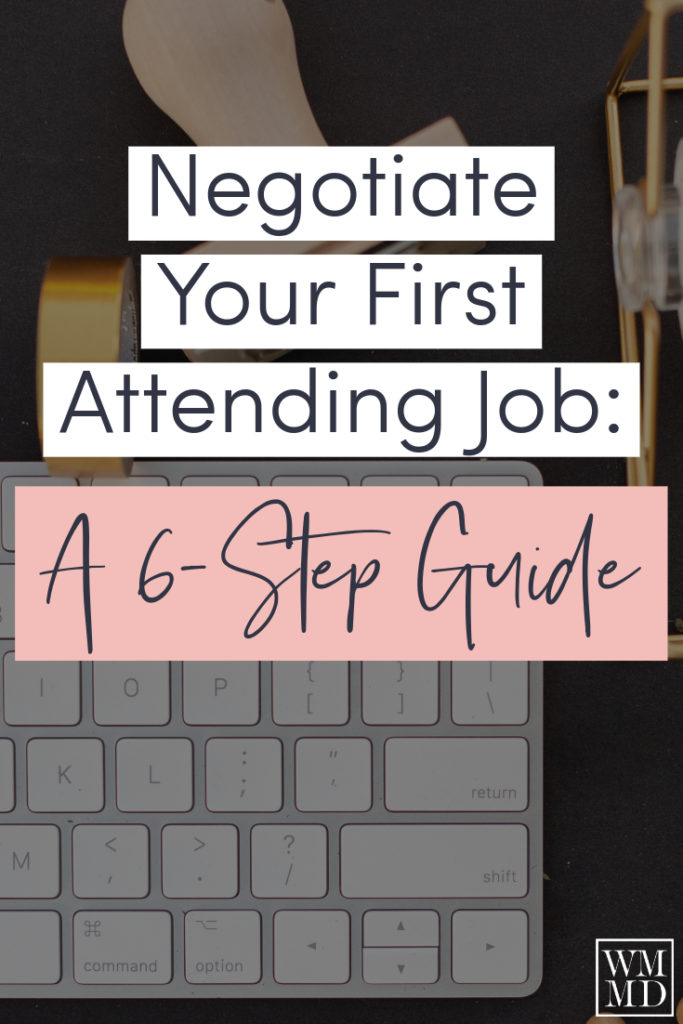This is a guest post by Dr. Linda Street. Dr. Linda Street is a Certified Life Coach with a focus on Negotiations, a Board-certified Obstetrician and Maternal Fetal Medicine specialist, blogger, speaker and Founder/admin of NegotiatHER facebook group.
Up until now, your entire medical education has been an uphill climb competing for a few choice spots. Shifting gears from vying for that coveted position at your ideal program to interviewing for your first job is a complete 180-degree turn. This is one of the most important financial choices you will make. How much you earn directly correlates to how much you can save/invest/spend etc. AND is the jumping point for all future salary increases.
So now that I’ve convinced you this is important, how do you do it?
The most crucial step to nailing a negotiation is preparation. Preparation begins with finding the right job (or two if you want more leverage). Next comes offers. What about your offer do you like? What don’t you like? Look at it from the lens of your needs, then go back and look at it to gain insight on your potential employer’s needs to help frame your negotiation. Next, follow these 6 steps.
Ace the negotiation before you walk into the door (or bomb it…)
90% of negotiation is mindset. Managing your mind is essential. Stick with me. Let’s look at a tale of two docs.
- Doctor A is terrified of negotiating. She is convinced she’s bad at it. She thinks they won’t give her any more than the initial offer so why bother. Doc A isn’t sure she deserves any more money and is glad they’re offering her a job and not seeing her as the imposter she thinks she is. She is likely to take their first offer and call it a day.
- Doctor B hasn’t negotiated before either, but she knows she can figure things out. She knows the value she brings and shows up with confidence. Doc B feels like this is important enough to do her homework and get the best deal possible.
These two docs have the same skill set. Who do you think gets the better deal? Who do you want to hire?
Doctor B comes out ahead for two reasons,
- She asks for what she’s worth and she expects she’ll get it.
- She exudes confidence and that makes her employer WANT her more which makes them more likely to respect her requests. Wouldn’t you want a confident partner who can stay collected under pressure?
If you need help with this spend some time writing out everything you have to offer and why they would be lucky to have you. If you need more help, consider hiring a coach. This is not the place to pinch pennies and the return on your investment will be worth it. Your mindset sets the stage for the entire process.

Don’t accept a Corolla on a Tesla Budget
Know your worth. If you walk in with no idea of what you SHOULD be being paid you will have absolutely no idea whether your offer is good or bad. You don’t want to be offered a 5th percentile salary and say yes just because it dwarfs your PGY-4 paycheck. It also may not serve you to walk in fresh out of training asking for a salary in the 99th percentile. So due diligence is key.
Great resources include:
- Co-residents who recently graduated (the stigma against discussing money has got to stop!) and faculty in your training program.
- Survey-based data such as
Having an idea of what you would like to make BEFORE you have a job offer is a great way to look at this objectively before your brain is constrained by an offer in hand. Write this down, aim for no lower than the 50th percentile for your field (better yet aim for the 75th!). Richard Shell, a professor at Wharton Business School and author of “Bargaining for Advantage: Negotiation Strategies for Reasonable People” teaches that JUST by having higher expectations people on average negotiate a higher amount.
The only failure is not asking
We’re brought up to think failure is kryptonite for eery type A medical brain. But what if it wasn’t? What if failure was just learning one way that didn’t work and then going back and asking a different way? The only failure in negotiation is not asking. Do NOT be afraid to ask! Odds are your future group EXPECTS you to negotiate. Their first offer is simply a jumping-off point, view it as such. Look at the contract and evaluate it critically, have a trusted mentor/friend/lawyer help (do NOT skip the lawyer!).
Where is the salary compared to the goal you set in the last step? What is the bonus structure? How does your compensation change over time (i.e. when do you become partner? What is your buy-in? When can you expect a raise? Does the compensation change from guarantee to production?) This segues nicely into the next step.
Understand how you are paid
A little homework in compensation structures will go a long way. Payment for physicians can come from many different buckets, common ones include
- Salary (aka “guarantee”)- this is money that shows up in equal increments in your paychecks. This doesn’t vary based on what you do. The advantage of a pure salary position is that it is reliable, the caveat is that you get paid the same no matter how hard you work.
- Production based- this comes in two flavors, collections (impacted by collection rates, payer mix, lag time) or work relative value units or wRVU. wRVU is a standardized measure assigned by CMS that is based on the encounter or procedure you are billing. Your employer will then assign a certain dollar value to each wRVU which can either be tiered or not and then you’re paid based on how many wRVUs you earn. There’s a great calculator at https://www.aapc.com/practice-management/rvu-calculator.aspx that lets you calculate how many wRVU’s you get per common CPT codes. If I am speaking Greek here you may need to do some googling, these terms will likely be important in attending life!
- A Hybrid model- Any imaginable mix of the above with a base salary and a bonus structure based on wRVUs or collections (or quality metrics etc.)

But wait, Money isn’t everything
Know the value of non-financial asks. These are things that can have enormous value to you personally but do not always have a dollar amount associated with them. Non-financial asks are a great way to sweeten the pot when you are close to making a deal but not quite there. These are things like benefits (health insurance, vision, dental, contribution to retirement accounts) vacation time/PTO, administrative time (for charting catch up, participation in hospital committees, teaching) and things that make your life easier (scribes, etc.)
You’re marrying your job, don’t do it without a prenup
While many of us want our job to be the perfect fit and last forever, that is typically not the case. While this varies by specialty, a quick google search reveals that up to 70% of doctors leave their first job within 5 years. This makes it absolutely essential to plan for this in your contract. Two main considerations are
- Malpractice tail insurance. If you are offered an occurrence-based malpractice policy, congratulations you can stop reading. However, most policies are claims-made which means that if you leave your employer and get sued afterwards you’ll need some coverage. This is where tail insurance is important, it covers you until a suit can no longer be filed. Depending on what area of the country you practice in and what specialty you are this could vary from being a nuisance purchase to a 6 figure investment. If you are able to negotiate it into your contract it’s simply taken care of. Some places will foot the entire bill and others will be willing to incorporate tail insurance as an incremental benefit based on how long you stay in your job (i.e. if you stay 1 year they’ll pay 25% of your tail and increase for each year you stay with complete payment if you stay more than say 3-5 years).
- Restrictive covenants or “non-competes”. Enforceability depends on what state you practice in, but the process can be a headache at best and a legal battle at worst. While you’re on the front end it's wise to assume that this will be enforceable and negotiate to either not have one or to limit the distance/time frame.
This is an exciting time to transition from training into actually doing what you have always wanted to do. Make sure you can do it with peace of mind by following these 6 simple steps to ensure you’ve negotiated the job of your dreams.

Get the bestselling book - Defining Wealth for Women.



